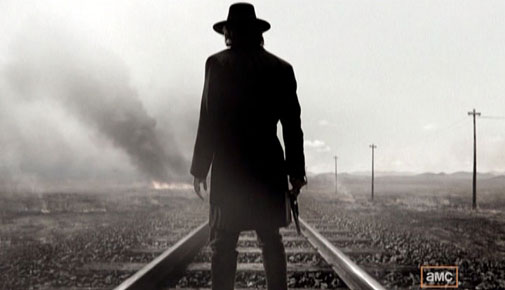
Hollywood's John Wayne westerns gave us a tidy-looking old west with meticulously pressed costumes, freshly shorn hair and brightly lit saloons. With portraits like Robert Altman's McCabe and Mrs. Miller (1971) and HBO's Deadwood (2004), we got a more physical feel for the time and place -- muddy streets, scraggly beards and bad teeth.
And that's a good bit of the appeal of AMC's new Hell On Wheels (premiering Sunday at 10 p.m. ET) -- it palpably grounds us in the post-Civil War frontier of the transcontinental railroad race westward. It's a dirty, harsh, engrossing set piece.
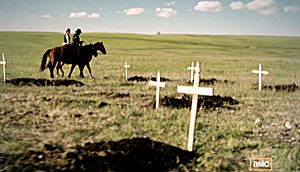
Comparisons to the foul-mouthed Deadwood will, fortunately or unfortunately, be coming early and often for the AMC show. There's just too much crossover between the two ensembles not to notice -- from ex-soldiers haunted by their horrific pasts, to the grizzled, happy hookers accompanying the workers camp as they lay rails west.
But while Deadwood perhaps focused exclusively on the moral relativism of individuals on a lawless frontier, Hell On Wheels is much broader in scope. It takes on the rebirth of a nation after almost splitting apart, with all the political and ethnic strife that comes along with it.
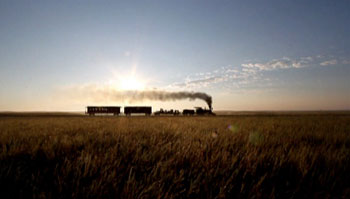
The new country of HOW is a vast and largely empty America -- raw, natural and harsh. Its virgin landscape is crawled by bands of bitter Southerners, freed blacks, Irish immigrants and hostile Native Americans, all out on the open range, with only their own groups to rely on. Everyone else is not to be trusted. More likely, they're to be cheated or bushwhacked.
Alongside Mad Men and Breaking Bad, this is another visually rich AMC banquet of hauntingly rough and beautiful panoramas. Tantalizing period accessories and obsolete technology put us right into the time and space of things.
So does the sound -- the startling dynamite blasts just over the hills ahead of the train gangs, cutting the terrain back, black plumes all too clear and portentous. The railroads are blasting and clearing their way west in a kind of historical eco-terrorism that, of course, set the tone for things to come in the 20th century. It's an American tale of making nature submit.
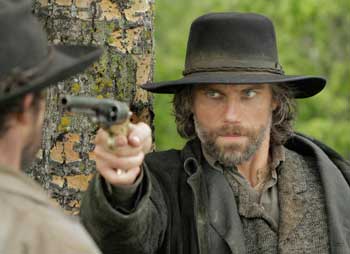
Most notable here is yet another brilliant AMC choice of a lead actor, this time Anson Mount, as ex-Confederate soldier Cullen Bohannon. He heads the cast and the railroad construction gang pushing their way through Nebraska toward the Pacific. The show rests squarely, and successfully, on his shoulders.
Bohannon is a shadowy figure, a former slave owner with perhaps a few war crimes of his own. He's on a mission of vengeance -- to track down the Yankee squad that raped and murdered his wife as the war was ending -- which is the show's long arc. He's going to find and pick them off one by one, if the first few shows are an indication.
Mount's masterful performance highlights one weakness of Hell On Wheels. Around complex characters such as Bohannon, or widow and railroad pioneer Lily Bell (Dominique McElligot), we get flatter, almost cardboard cutouts.
Colm Meaney, playing real-life railroad entrepreneur Thomas 'Doc' Durant may as well enter on a silent screen, to the tune of a player piano and the subtitle card "Curses -- it's Snidely Whiplash."
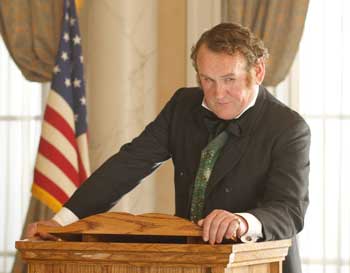
Meaney's character is saddled with expository rants, one assumes, because the producers of Hell On Wheels don't trust the audience to absorb the moral gray areas of the backstory. Long chunks of history lessons are packaged as idle musings by Meaney's megalomaniac character. It's a relatively minor but regular intrusion that stalls the story, if not quite -- er, derails it.
"Plottus Interruptus" aside, there is AMC's continuing grim commitment to leading the way in unvarnished ad-supported violence, once the territory of premium cable. Standing on the shoulders of their gut-fest The Walking Dead, Sunday's HOW pilot serves up, count 'em, a full and graphic scalping, multiple close-up stabbings, various impalements, and one ax square to the chest.
Chilling stuff, and a vision of the west far removed from that of, say, Dr. Quinn Medicine Woman with its quaint homesteading values. Are these necessary arrows in the storytelling quiver to set the historical values of the piece, to ram home the thinness of life on the harsh prairie?
In any event, Hell on Wheels has the right ingredients to sustain a compelling series. The question, as with Deadwood, is whether Hell On Wheels can forge a new-style western that finds a dedicated audience, or whether it's yet another signal the genre is pretty much played out for now.
Punch a ticket for the ride, and see.